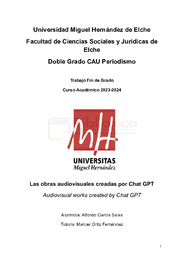Por favor, use este identificador para citar o enlazar este ítem:
https://hdl.handle.net/11000/33342Registro completo de metadatos
| Campo DC | Valor | Lengua/Idioma |
|---|---|---|
| dc.contributor.advisor | Ortiz Fernández, Manuel | - |
| dc.contributor.author | García Salas, Alfonso | - |
| dc.contributor.other | Departamentos de la UMH::Ciencias Sociales y Humanas | es_ES |
| dc.date.accessioned | 2024-09-30T13:46:57Z | - |
| dc.date.available | 2024-09-30T13:46:57Z | - |
| dc.date.created | 2024-06 | - |
| dc.identifier.uri | https://hdl.handle.net/11000/33342 | - |
| dc.description.abstract | El presente Trabajo de Fin de Grado (TFG) se enfoca en analizar los desafíos relacionados con la autoría y la originalidad de las obras audiovisuales generadas por Chat GPT, una avanzada herramienta de inteligencia artificial desarrollada por OpenAI. La utilización de esta tecnología para crear contenido audiovisual plantea cuestiones complejas sobre quién debe ser reconocido como autor de una obra y bajo qué criterios una creación puede considerarse original. Este estudio examina detalladamente las implicaciones legales y éticas de atribuir autoría a las producciones generadas total o parcialmente por Chat GPT, considerando las normativas actuales y los desafíos específicos que surgen en este contexto. Además, se propone un marco de posibles soluciones para gestionar adecuadamente estos desafíos, ofreciendo recomendaciones para la atribución de autoría y la protección de los derechos creativos. A través de un enfoque multidisciplinar que combina análisis legal, ético y técnico, este TFG pretende proporcionar una comprensión integral y propuestas prácticas para la gestión de obras audiovisuales creadas con Chat GPT en el ámbito de la comunicación audiovisual. Se aborda la revisión exhaustiva de la literatura académica y la legislación vigente, además de un análisis detallado de casos específicos donde Chat GPT ha sido utilizado para la creación de contenido audiovisual. Este análisis incluye tanto éxitos como disputas legales y controversias, lo que permite identificar las mejores prácticas y las áreas con mayores desafíos. Los hallazgos de este estudio no solo abordan las problemáticas actuales, sino que también buscan anticipar futuras controversias y establecer bases sólidas para la creación de políticas y normativas adaptadas a la era de la inteligencia artificial. Se desarrollan criterios claros para la atribución de autoría y la evaluación de la originalidad en obras generadas por Chat GPT, así como recomendaciones dirigidas a legisladores y organismos reguladores para actualizar las normativas existentes y enfrentar eficazmente los desafíos que plantean las creaciones de IA. Este TFG busca contribuir de manera significativa al debate en curso sobre la integración de la inteligencia artificial en la creación audiovisual y ofrecer soluciones prácticas para una convivencia armónica entre la creatividad humana y la innovación tecnológica. | es_ES |
| dc.description.abstract | This Final Degree Project (TFG) focuses on analyzing the challenges related to authorship and originality of audiovisual works generated by Chat GPT, an advanced artificial intelligence tool developed by OpenAI. The use of this technology to create audiovisual content raises complex questions about who should be recognized as the author of a work and under what criteria a creation can be considered original. This study thoroughly examines the legal and ethical implications of attributing authorship to productions generated entirely or partially by Chat GPT, considering current regulations and the specific challenges that arise in this context. Additionally, it proposes a framework of possible solutions to adequately manage these challenges, offering recommendations for authorship attribution and the protection of creative rights. Through a multidisciplinary approach that combines legal, ethical, and technical analysis, this TFG aims to provide a comprehensive understanding and practical proposals for managing audiovisual works created with Chat GPT in the field of audiovisual communication. It includes an exhaustive review of academic literature and current legislation, as well as a detailed analysis of specific cases where Chat GPT has been used to create audiovisual content. This analysis includes both successful cases and legal disputes and controversies, identifying best practices and areas with the greatest challenges. The findings of this study not only address current issues but also seek to anticipate future controversies and establish solid foundations for the creation of policies and regulations adapted to the era of artificial intelligence. Clear criteria for authorship attribution and originality assessment in works generated by Chat GPT are developed, along with recommendations aimed at legislators and regulatory bodies to update existing regulations and effectively address the challenges posed by AI creations. This TFG seeks to contribute significantly to the ongoing debate on the integration of artificial intelligence in audiovisual creation and offer practical solutions for harmonious coexistence between human creativity and technological innovation. | es_ES |
| dc.format | application/pdf | es_ES |
| dc.format.extent | 28 | es_ES |
| dc.language.iso | spa | es_ES |
| dc.publisher | Universidad Miguel Hernández de Elche | es_ES |
| dc.rights | info:eu-repo/semantics/openAccess | es_ES |
| dc.rights | Attribution-NonCommercial-NoDerivatives 4.0 Internacional | * |
| dc.rights.uri | http://creativecommons.org/licenses/by-nc-nd/4.0/ | * |
| dc.subject | autoría | es_ES |
| dc.subject | originalidad | es_ES |
| dc.subject | Chat GPT | es_ES |
| dc.subject | obras | es_ES |
| dc.subject | propiedad intelectual | es_ES |
| dc.subject | authorship | es_ES |
| dc.subject | originality | es_ES |
| dc.subject | Works | es_ES |
| dc.subject | Intellectual Property | es_ES |
| dc.subject.other | CDU::7 - Bellas artes::77 - Fotografía. Cinematografía | es_ES |
| dc.title | Las obras audiovisuales creadas por Chat GPT | es_ES |
| dc.title.alternative | Audiovisual works created by Chat GPT | es_ES |
| dc.type | info:eu-repo/semantics/bachelorThesis | es_ES |

Ver/Abrir:
TFG Comunicación Audiovisual.pdf
527,39 kB
Adobe PDF
Compartir:
 La licencia se describe como: Atribución-NonComercial-NoDerivada 4.0 Internacional.
La licencia se describe como: Atribución-NonComercial-NoDerivada 4.0 Internacional.
.png)